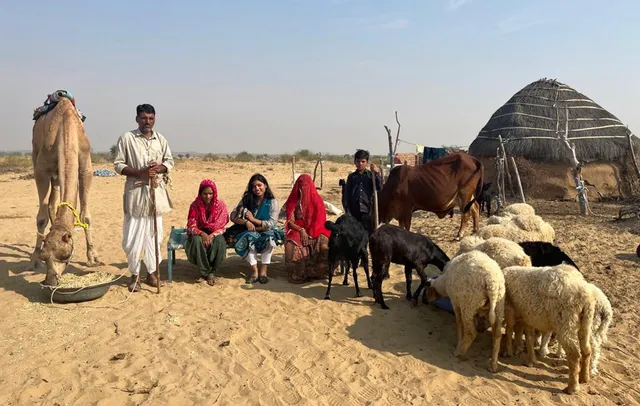
Introduction:
In 2017, Aakriti Srivastava, a journalism student, embarked on a task to cover the pastoral life in the Thar Desert.
Little did she know that this assignment would become the catalyst for a transformative journey that led to the creation of Bahula Naturals in 2022.
This unique venture not only supports the livelihoods of camel herders but also addresses the struggles faced by the pastoral communities in the wake of government regulations that adversely affected camel farming.
The Plight of Camel Herders:
Before 2015, camels were prized possessions for farmers in the Thar Desert.
However, a government act prohibited the slaughter and export of camels to neighboring states, drastically impacting the livelihoods of camel owners.
With the inability to sell or trade their camels, many farmers were forced to work as daily wage laborers at mines and brick kilns.
The market value of camels plummeted from Rs. 1 lakh to Rs. 4000, leading to a significant decline in the camel population in the region.
Importance of Camels in the Desert Ecosystem:
Camels play a crucial role in the desert ecosystem.
Pastoral communities, who travel extensively with their livestock, enrich the soil through their droppings during this movement.
Camels are essential for drawing water, cultivating farms, and aiding in transportation.
The decline in the camel population posed a threat not only to the livelihoods of camel herders but also to the delicate balance of the desert ecosystem.
The Birth of Bahula Naturals:
Recognizing the plight of camel herders and the dwindling population of camels, Aakriti Srivastava founded Bahula Naturals in 2022.
The primary objective was to support the livelihoods of camel herders by selling camel milk and camel milk-based products in the market.
This initiative aimed to provide a sustainable source of income for the pastoral communities while promoting the conservation of camels in the Thar Desert.
Overcoming Challenges and Building Connections:
The initial journey for Bahula Naturals was challenging, but strategic initiatives, such as establishing chilling plants at critical locations, played a pivotal role in connecting the demand side (customers) with the supply side (camel herders).
These efforts not only ensured the availability of nutritious camel milk products in the market but also strengthened the bond between consumers and the farmers associated with Bahula Naturals.
Health Benefits of Camel Milk:
Camel milk and its products have proven health benefits, including aiding in managing diabetes, high blood pressure, and cardiovascular diseases.
Beyond the health advantages, Bahula Naturals has become a symbol of revival for a community that faced the threat of extinction.
Some households, previously earning nothing, now generate Rs. 12,000 per month, showcasing the positive impact on individual lives.
Financial Success and Conservation Efforts:
In just one year, Bahula Naturals achieved an impressive Rs. 1 crore in revenue, marking a significant milestone for both the venture and the camel herders it supports.
This success not only contributes to the economic well-being of the community but also serves as a beacon of hope for the conservation of camels in the Thar Desert.
Conclusion:
Bahula Naturals exemplifies the power of entrepreneurship to bring about positive change in communities facing adversity.
By addressing the challenges of camel herders and leveraging the potential of camel milk, Aakriti Srivastava has not only revived livelihoods but has also played a crucial role in the conservation of camels in the Thar Desert.
The success of Bahula Naturals is a testament to the transformative impact that socially conscious ventures can have on marginalized communities and the delicate ecosystems they inhabit.







